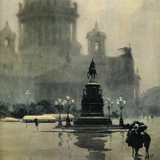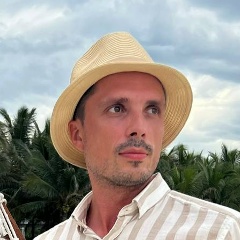"Музыка неоценима как величайшее средство воодушевления, как сила, которая влечет нас ввысь и вперед, если дух уже подготовлен для ее воздействия. Но литература, как видно, опередила ее. Сама по себе музыка не двинет мир дальше. Сама по себе музыка – опасна. А лично для вас, инженер, она особенно опасна. Я это сразу понял по вашему лицу, когда вошел.."
Ганс Касторп слушает "Послеполуденный отдых Фавна" Дебюсси:
"…это была идиллия, но идиллия рафинированная, автор построил ее и живописал с помощью скупых и вместе с тем осложненных приемов новейшего искусства, чисто оркестровая вещь, без пения, симфоническая прелюдия, написанная французом; она исполнялась сравнительно небольшим по теперешним понятиям ансамблем, однако была промыта всеми водами современной техники звука и хитроумно построена так, чтобы окутать душу пеленою грез. И воображением Ганса Касторпа, когда он слушал эту вещь, овладевала всегда одна и та же греза: перед ним – заросшая пестрыми астрами, залитая солнцем лесная полянка; он лежит на спине, под головой небольшой холмик, одну ногу он поставил стоймя и слегка согнул в колене, другую перекинул через нее, – однако ноги у него не человечьи, это ноги фавна. Лишь для собственного удовольствия, ибо полянка совершенно пустынна, перебирает он лады деревянной дудочки, которую держит во рту – не то кларнет, не то свирель, извлекая из нее мирные, чуть гнусавые звуки; они свободно льются один за другим, как им вздумается и все же в приятной последовательности, и эта беззаботная, чуть гнусавая песенка уносится в ярко-синее небо, а под ними блестит в лучах солнца и колеблется в легком ветерке узорная листва берез и ясеней. Но это задумчивое, безответственное, полупевучее дуденье недолго остается единственным голосом одиночества. Жужжанье насекомых над травою, в горячем летнем воздухе, само сиянье солнца, ветерок, покачивание зеленых крон, блеск листьев – весь этот летний, мирный, чуть зыблемый покой вокруг становится пестрым звучанием, он придает напевам простодушной свирели непрерывно меняющийся, всегда удивительно изысканный гармонический смысл. Симфоническое сопровождение то отступит, то смолкнет совсем; но Ганс с ногами фавна продолжает играть, и наивное однозвучие его песенки снова будит утонченнейшие по колориту, волшебные звучания природы; еще одна пауза – и это звучание сладостно и мощно перерастает самое себя, в него быстро, один за другим, вступают все новые, все более высокие инструментальные голоса, и тогда уже, себя не сдерживая, оно разражается всей своей полнотой – пусть лишь на беглый миг, но эта полнота дает блаженство совершенного удовлетворения, ибо оно несет в себе вечность.
Молодой фавн был очень счастлив на своей летней полянке. Здесь не требовали никакого "оправдайся!", не возлагали никакой ответственности, никакой военно-духовный суд не угрожал тому, кто забыл честь и потерял себя. Здесь царило великое забвенье, блаженная неподвижность, невинность безвременности; это была распущенность, но без всяких угрызений совести, полное отрицание западного приказа быть активным, воплощенный в образах, желанный апофеоз этого отрицания, почему исходившее от пластинки успокоение и заставляло ночного музыканта предпочитать ее многим другим". Томас Манн. Волшебная гора.
Ганс Касторп слушает "Послеполуденный отдых Фавна" Дебюсси:
"…это была идиллия, но идиллия рафинированная, автор построил ее и живописал с помощью скупых и вместе с тем осложненных приемов новейшего искусства, чисто оркестровая вещь, без пения, симфоническая прелюдия, написанная французом; она исполнялась сравнительно небольшим по теперешним понятиям ансамблем, однако была промыта всеми водами современной техники звука и хитроумно построена так, чтобы окутать душу пеленою грез. И воображением Ганса Касторпа, когда он слушал эту вещь, овладевала всегда одна и та же греза: перед ним – заросшая пестрыми астрами, залитая солнцем лесная полянка; он лежит на спине, под головой небольшой холмик, одну ногу он поставил стоймя и слегка согнул в колене, другую перекинул через нее, – однако ноги у него не человечьи, это ноги фавна. Лишь для собственного удовольствия, ибо полянка совершенно пустынна, перебирает он лады деревянной дудочки, которую держит во рту – не то кларнет, не то свирель, извлекая из нее мирные, чуть гнусавые звуки; они свободно льются один за другим, как им вздумается и все же в приятной последовательности, и эта беззаботная, чуть гнусавая песенка уносится в ярко-синее небо, а под ними блестит в лучах солнца и колеблется в легком ветерке узорная листва берез и ясеней. Но это задумчивое, безответственное, полупевучее дуденье недолго остается единственным голосом одиночества. Жужжанье насекомых над травою, в горячем летнем воздухе, само сиянье солнца, ветерок, покачивание зеленых крон, блеск листьев – весь этот летний, мирный, чуть зыблемый покой вокруг становится пестрым звучанием, он придает напевам простодушной свирели непрерывно меняющийся, всегда удивительно изысканный гармонический смысл. Симфоническое сопровождение то отступит, то смолкнет совсем; но Ганс с ногами фавна продолжает играть, и наивное однозвучие его песенки снова будит утонченнейшие по колориту, волшебные звучания природы; еще одна пауза – и это звучание сладостно и мощно перерастает самое себя, в него быстро, один за другим, вступают все новые, все более высокие инструментальные голоса, и тогда уже, себя не сдерживая, оно разражается всей своей полнотой – пусть лишь на беглый миг, но эта полнота дает блаженство совершенного удовлетворения, ибо оно несет в себе вечность.
Молодой фавн был очень счастлив на своей летней полянке. Здесь не требовали никакого "оправдайся!", не возлагали никакой ответственности, никакой военно-духовный суд не угрожал тому, кто забыл честь и потерял себя. Здесь царило великое забвенье, блаженная неподвижность, невинность безвременности; это была распущенность, но без всяких угрызений совести, полное отрицание западного приказа быть активным, воплощенный в образах, желанный апофеоз этого отрицания, почему исходившее от пластинки успокоение и заставляло ночного музыканта предпочитать ее многим другим". Томас Манн. Волшебная гора.
"Music is invaluable as the greatest means of inspiration, as a force that drives us up and forth, if the spirit is already prepared for its impact. But literature, as you can see, has outstripped it. Music alone will not move the world further. Music alone is dangerous But for you personally, the engineer, she is especially dangerous. I immediately knew it from your face when I entered .. "
Hans Castorp listens to Faun’s Afternoon Rest by Debussy:
"... it was an idyll, but a refined idyll, the author built it and painted it with the help of the meager and at the same time complicated techniques of the newest art, a purely orchestral thing, without singing, a symphonic prelude written by a Frenchman; it was performed by a relatively small ensemble of the present concepts, however All the waters of the modern technology of sound and cleverly constructed so as to envelop the soul with a shroud of dreams were washed in. And the same dream always filled the imagination of Hans Kastorp: when he listened to this thing, it was overgrown with variegated the forest glade sunlit by the asters, he lay on his back, under a small hillock, he put one leg upright and slightly bent at the knee, threw another over it - but his legs are not human, they are the legs of a faun. because the glade is completely deserted, it goes through the frets of a wooden pipe that it holds in its mouth — not the clarinet, not the pipe, extracting peaceful, slightly nasal sounds from it, they freely pour one after another, as they please and yet in a pleasant sequence and this carefree chut nasal song is carried away in the bright blue sky, and beneath them glitters in the sun and varies breeze patterned foliage of birch and ash trees. But this brooding, irresponsible, semi-academic dude does not long remain the only voice of solitude. The buzz of insects above the grass, in the hot summer air, the very radiance of the sun, the breeze, the swaying of green crowns, the shine of the leaves - all this summer, peaceful, slightly unstable calm around becomes a motley sound, it gives to the simple-hearted flute of constantly changing, always surprisingly refined harmonic meanings . The symphonic accompaniment will then retreat, then cease altogether; but Hans with the legs of the faun continues to play, and the naive repetition of his songs again awakens the most refined in color, the magical sounds of nature; one more pause - and this sound sweetly and powerfully overgrows itself, new, ever higher instrumental voices enter it quickly, one after another, and then, without restraining themselves, it breaks out with all its fullness - even if only fluent a moment, but this fullness gives bliss of perfect satisfaction, for it carries in itself eternity.
The young faun was very happy in his summer meadow. No “justified!” Was demanded here, no responsibility was imposed, no military-spiritual court threatened those who forgot their honor and lost themselves. Here reigned great oblivion, blissful immobility, innocence of timelessness; it was licentiousness, but without any remorse, a complete rejection of the Western order to be active, embodied in images, the desired apotheosis of this denial, why the calm emanating from the record and made the night musician prefer it to many others. "Thomas Mann. Magic Mountain.
Hans Castorp listens to Faun’s Afternoon Rest by Debussy:
"... it was an idyll, but a refined idyll, the author built it and painted it with the help of the meager and at the same time complicated techniques of the newest art, a purely orchestral thing, without singing, a symphonic prelude written by a Frenchman; it was performed by a relatively small ensemble of the present concepts, however All the waters of the modern technology of sound and cleverly constructed so as to envelop the soul with a shroud of dreams were washed in. And the same dream always filled the imagination of Hans Kastorp: when he listened to this thing, it was overgrown with variegated the forest glade sunlit by the asters, he lay on his back, under a small hillock, he put one leg upright and slightly bent at the knee, threw another over it - but his legs are not human, they are the legs of a faun. because the glade is completely deserted, it goes through the frets of a wooden pipe that it holds in its mouth — not the clarinet, not the pipe, extracting peaceful, slightly nasal sounds from it, they freely pour one after another, as they please and yet in a pleasant sequence and this carefree chut nasal song is carried away in the bright blue sky, and beneath them glitters in the sun and varies breeze patterned foliage of birch and ash trees. But this brooding, irresponsible, semi-academic dude does not long remain the only voice of solitude. The buzz of insects above the grass, in the hot summer air, the very radiance of the sun, the breeze, the swaying of green crowns, the shine of the leaves - all this summer, peaceful, slightly unstable calm around becomes a motley sound, it gives to the simple-hearted flute of constantly changing, always surprisingly refined harmonic meanings . The symphonic accompaniment will then retreat, then cease altogether; but Hans with the legs of the faun continues to play, and the naive repetition of his songs again awakens the most refined in color, the magical sounds of nature; one more pause - and this sound sweetly and powerfully overgrows itself, new, ever higher instrumental voices enter it quickly, one after another, and then, without restraining themselves, it breaks out with all its fullness - even if only fluent a moment, but this fullness gives bliss of perfect satisfaction, for it carries in itself eternity.
The young faun was very happy in his summer meadow. No “justified!” Was demanded here, no responsibility was imposed, no military-spiritual court threatened those who forgot their honor and lost themselves. Here reigned great oblivion, blissful immobility, innocence of timelessness; it was licentiousness, but without any remorse, a complete rejection of the Western order to be active, embodied in images, the desired apotheosis of this denial, why the calm emanating from the record and made the night musician prefer it to many others. "Thomas Mann. Magic Mountain.
У записи 5 лайков,
1 репостов.
1 репостов.
Эту запись оставил(а) на своей стене Любовь Ладыга

























